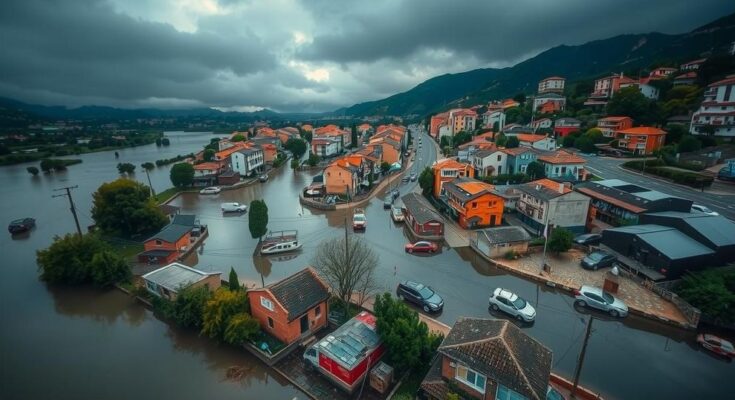A severe flooding event in eastern Spain on October 31, 2024, resulted in at least 158 deaths, primarily in the Valencia region. Sudden flash floods triggered by heavy rainfall overwhelmed communities as people were caught unaware in their homes and vehicles. Recovery efforts are ongoing amid power and supply shortages as experts point to climate change as a significant factor behind this deadly storm.
On October 31, 2024, eastern Spain experienced devastating flash floods resulting from severe rainfall, which tragically claimed the lives of at least 158 individuals. The towns, particularly in the Valencia region, were caught off guard as torrents of muddy water surged over riverbanks, sweeping away homes, vehicles, and livelihoods in mere moments. Residents found themselves trapped, many perishing in their cars or homes. Authorities reported recovering 158 bodies, with the significant number of casualties occurring predominantly in Valencia, highlighting the disaster’s severe impact. As recovery continues, survivors endeavor to clear out mud and debris, facing challenges such as power outages and shortages of essential supplies. This catastrophic event was triggered by an extreme weather phenomenon associated with climate change, where a cut-off low-pressure storm system stalled over the region, combined with unusually high temperatures of the Mediterranean Sea. Experts suggest that such extreme flooding, while historically not unprecedented in Spain, had not occurred to this degree since the disastrous floods of 1957. In fact, many older residents recall this recent flooding as being significantly worse than the three major floods of the past, underscoring an alarming trend of increased rainfall intensity during autumn months.
In recent years, Spain has faced various climate-related challenges, including prolonged droughts followed by extreme flooding. The serious storm on October 31, 2024, is part of a growing pattern attributed to climate change, characterized by increased rainfall associated with warmer temperatures and changes in atmospheric conditions. Understanding the context of this disaster sheds light on the vulnerability of communities in the Mediterranean region to extreme weather phenomena, which are becoming increasingly frequent due to shifting climate patterns.
The catastrophic flooding in Spain serves as a stark reminder of the impacts of climate change, with scientists linking the events to a combination of human-induced climate factors. As the nation navigates recovery efforts, the tragedy emphasizes the need for increased preparedness and resilience in the face of future extreme weather events. The loss of life and disruption to communities highlight an urgent call to address climate vulnerabilities and implement strategies to mitigate the effects of such disasters.
Original Source: apnews.com




